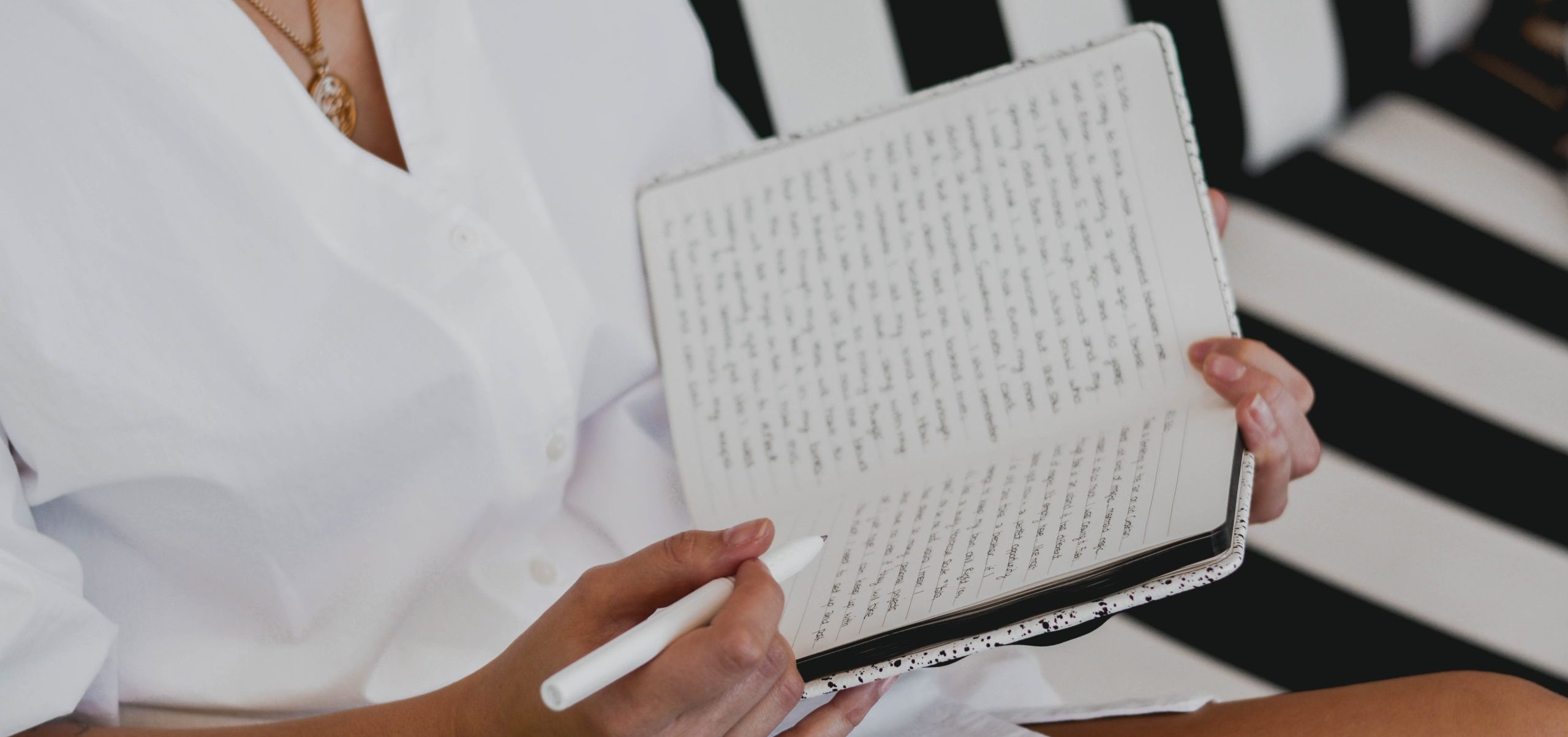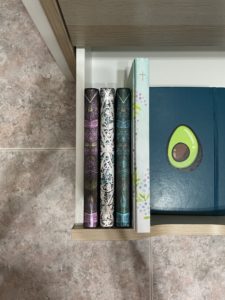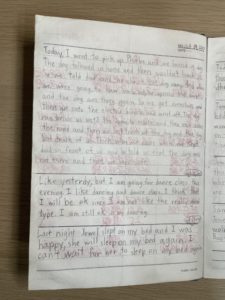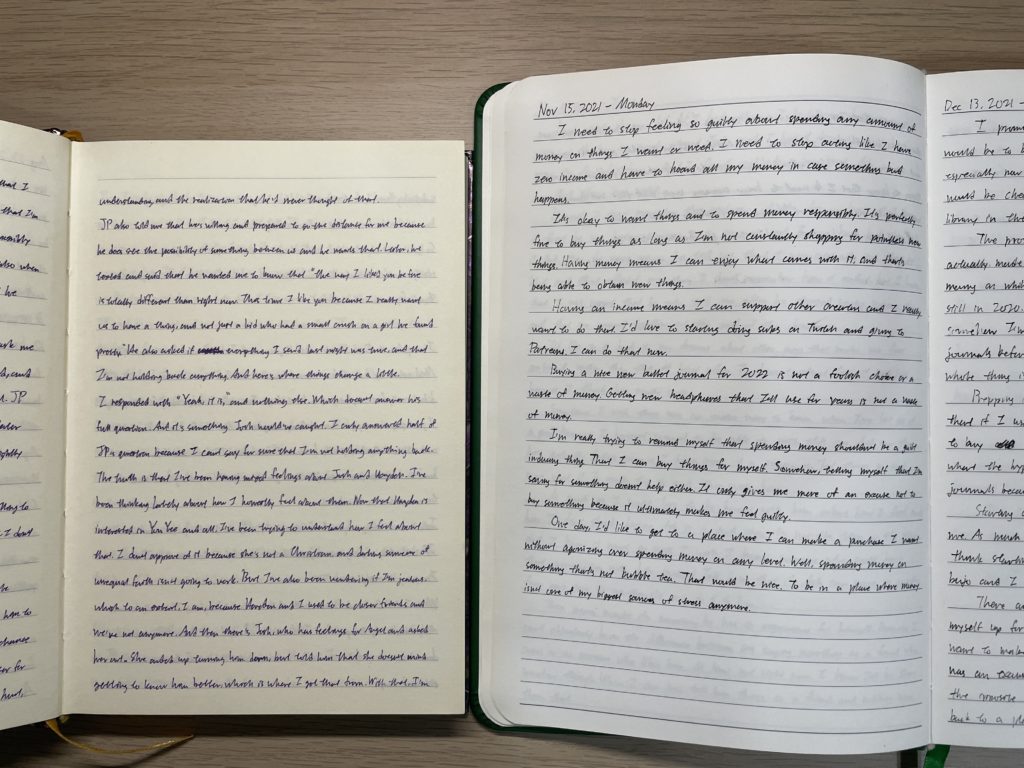
5 Ways Journaling Has Impacted Me
I wish I could remember exactly how old I was when I started journaling. The first journal I had is either buried in a box somewhere or was lost during one of the last moves my family made. Of the noteboks that survived, I managed to find one dating back to 2007, when I was 11.
It was very short lived. With only about 10-15 entries spanning a year, I wasn’t old enough for the “commitment” to keeping a journal, though I liked the idea of it. Journaling was encouraged by my homeschooling program, but it was also an idea that I associated with being very American. Somehow, that came together and resulted in what I believe is my first journal.
What got me to start again and maintain consistency? An episode of The Simpsons, interestingly enough. In a Season 9 episode, Lisa writes in her diary after fearing that she will lose her intelligence. It wasn’t the first time I’d seen a fictional character writing in a diary, but for some reason it stood out to me.
I think I liked that she called it a “log” instead of a “diary,” which felt too girly and stereotypical for my tween tastes. For the first few years, I insisted that I “wrote in a log, not a diary,” even though they’re pretty much the same thing. Now, I call it a journal instead.
My journals from that moment on are most likely lost due to the move my family made back to Singapore. I wish I had them with me, but there’s not anywhere I can think of or find right now. Perhaps they’ll magically turn up in a random pile one day. It’s entirely possible, considering how much stuff my family and I have.
I actually went back to watch that episode of The Simpsons again because I have fond memories of it. Though I’m not really a fan of the show anymore, it is responsible for the many journals I’ve had.
Fast forward some 12-13 years and it’s still a habit I keep up with. Journaling has gotten me through a lot of things in life, impacting me in a way I never imagined. What started as a child-like desire to emulate a character I thought was smart has grown into such a big part of my life.
Processing Life
It wasn’t until a few years after I had started journaling regularly that I noticed a pattern. I was starting to write about the litte frustrations I experienced, and somehow that was giving me release. Getting the feelings out on the page meant I felt them less.
Writing became the primary way I processed what was going on in my life. Things that happened with friends, feelings I was trying to sort through about anything and everything. I understood more about what I was actually thinking and feeling by getting the words on a page. Moments when I hesitated with the pen were things I wasn’t ready to admit to myself yet.
I’m not sure if I became an internal processor because of journaling or if I was always an internal processor who needed to find journaling as an outlet. Either way, the habit has stuck. I write to process my life.

The times when I write the least tend to be the times when I don’t want to admit things to myself. Whether that be about friendships, life, or guys. I know that journaling will reveal things I’m not ready to admit or confront, so I keep the pen from touching the page,
It’s not the most helpful thing to actively avoid it when I’m being stubborn. Often times, I’ll end up writing for 10-15 pages after I finally sit down and open my journal. Everything comes rushing out and I feel better almost immediately.
Part of this has to do with how concrete something becomes when I can see real words in ink on a page. It’s no longer something that’s only in my head. And while no one reads my journals, there’s something scary about seeing my handwriting tell me something. It becomes more real to me when it’s been written down.
When I feel out of touch with my feelings, I need to write. When things don’t make sense to me, I need to write. When I need to figure out how I really feel, I need to write. It’s the physical action of putting paper that makes me feel like I have some understanding of myself.
The times when I’ve tried digital journaling haven’t been the same. Whether that be notes I keep locked on my phone or Word docs I kept on my laptop, nothing has been the same as a physical journal. I don’t feel the same sense of release and processing. For me, it has always been the pen and paper.
Written Memories
I’m both lucky and unlucky to have hundreds, if not thousands, of pages of memories. The fact that I can’t find some of my early journals worries me because that means someone could come across it in a dump somewhere and read all the embarrassing things I wrote about. But I also don’t want to have them because I’ll cringe if I read back what I used to write about.
And yet, it’s nice to have all those memories written down. I have concrete dates for things that have happened to me. There are things I don’t remember now that I can read about in my journal. Sometimes when I’m unclear about a series of events, I’ll turn to my journals to see if I wrote anything about it.

Someone asked me once what I write about and how to journal if they’re a “boring” person. The way I see it, journaling is whatever you want it to be. There are times when I write about how my week is going and the things that happen to me. Other times, it’s a reflection of something I read or something I need to get off my chest. There are also times when I keep things short because I don’t have a lot to write about either.
It’s not about being interesting. Writing, for me, is like remembering. So much would be lost to time if I didn’t write it down. Moments that I can’t recall now are tucked safely into the pages of a journal somewhere. Some of the best things I’ve found have come out of things I thought were boring to write down in the past.
Having these journals over the last 12ish years of my life means I do get to see how I’ve grown as a person. I can see what moments impacted me the most, what changed me in a positive or negative way. There are things in my journals that reveal how I became who I am. No matter how embarrassing, it’s nice to know that I cared enough to record these moments of my life.
Occasional Prayer Format
This is someting I discovered more in the last couple of years.
Prayer has always been something I struggled to keep consistent with because I forget. It wasn’t until a difficult time around my junior year of college that I started to use journaling as a way to write out prayers.
It happened by accident. I was journaling and it turned into a prayer. When I finished writing for that day, I realized that I didn’t have to view prayer as someting spoken or thought, it could be written too. There’s nothing to say that prayers couldn’t be written out, so I tend to write mine.
There are days when my journal entries read as one big prayer, one big conversation with God where I list out all the things I’m concerned about and scared of. There are many pages from the last two years where I’ve asked to understand why certain things aren’t happening for me.
I’ve always felt like my strengths lie in writing, and verbal prayer isn’t always the way to go for me. There are times when I can’t find the right words while speaking, but they come while I write. It’s easier for me to be honest when I write. To be more open with what I’m feeling and what I’m actually praying about. And sometimes, seeing the prayer gives me a piece of the answer.
Self-expression

It’s similar, but not quite the same as processing my life. As I said above, I more often find the right words when I’m writing. It happens more with a pen than with typing, though they can be quite close.
Part of me learning to express mysel properly during my teen year happened through journaling. Writing before I spoke about something made me less likely to choose the wrong words. It made me less likely to hurt someone, because I’ve been known to do that if I speak without thinking.
Years of writing have conditioned me to phrase things differently than when I speak. The words to best represent what I feel and what I’m going through are mostly found when I write. And I’ve had to reference my journals when I try to explain those feelings to other people verbally.
Without journaling, I’m not sure how I would have learned to express myself. I’m not sure that there would have been anything else. Nothing else that I’ve tried lands in the same way that writing does for me. Of course, there’s always the chance that something else would have become my outlet for self-expression, but with the person I am and the career I want to go into, writing makes the most sense.
Some part of this also stems from preferring to keep a lot of things to myself. Though I do put a lot on the Internet through my blog, my Bookstagram, and my YouTube channel, there’s a lot that I don’t say. There’s a lot that even the people close to me don’t know, with Jemi being the exception. Writing allows me to express myself without having to do it with other people.
I think there’s also something very different about writing as a form of self-expression. Much like art, it’s incredibly personal. That might sound dumb - calling self-expression a personal experience - but it is. Words make people vulnerable. Having them written out where someone could read it makes it even more so. Seeing the words instead of feeling them changes things.
Writing feels like leaving a small part of myself on a page. Nothing else gives me that feeling.
My ability to talk about how I feel comes largely from having written about those feelings first, having expressed them to myself in a safe space before anyone else gets to see what that looks like. The words I choose have grown more careful as I’ve grown as a writer. Journaling is what made that happen. It gave me a space to choose the right words for myself. To cultivate that ability to make a single word mean more.
The care with which I choose words to represent and reflect me have made me more aware of what power words have. Vocabulary has little to do with it. I rarely choose the big words when writing. It’s the little ones, the simple ones, that best convey what happens in my head. It simplifies something that otherwise feels too big.
Writing gives me a voice when I don’t feel like I have room for a spoken one. Being a quieter person, an introverted person, I don’t always feel like there’s room for me to speak. But writing? I can write more in a small space than I can speak. The more I feel unable to speak, the more I write. The less room there is for my voice, the greater the room for my pen.
Improving My Chicken Scratch Handwriting
Speaking of pens, journaling has helped with my handwriting. Kind of. I still write in a way that sometimes makes it hard for me to read, but I’ve gotten a lot better because I’m journaling almost every day. The repetition makes me more aware of how to make my handwriting legible.
It was through journaling that I also developed my handwriting. Before that, I didn’t have anything that was distinctly mine. It could be anyone’s work.
The more I wrote, the more comfortable I felt with a pen and the more distinct my handwriting became. The urge to get a lot onto the page made my words tiny. The fervor of trying to get everything out before it disappeared led to connecting my letters. Over time, my handwriting became distinctly hard for other people and myself to read.
The older I got and the more conscious I became with my writing, the easier it became to read my own words. Bad eyesight also played into this. I didn’t want to squint at my words anymore and make my vision worse, so the words gradually got bigger. They’re still not huge by any measure, but they’re not as tiny as they used to be. My eyes are grateful or that.

I’ve learned little things about how I write too. Like how my handwriting changes depending on which side of the page I write on. My emotions also dictate how my handwriting looks. Calm days equal nice, legible handwriting while anxious days mean crammed words and what looks like someone having a heart attack.
All this helps when I have to write for other people. It’s still not great for them, but it’s getting better. More often than not, I can at least read my own handwriting and decipher it, unlike the days when I wasn’t sure what I wrote either.
I’m sure that if I looked at my early journals, I could see the progression of my handwriting. Where I developed certain habits and which ones have stuck to this day.
There was a period of time when I tried super hard to make my handwriting look like a font. I would practice it while journaling, making my words look a certain way. It never stuck. Whatever I tried always got abandoned after a few weeks. I’d revert back to my tiny words that all looked very similar.
Thankfully, my natural handwriting has progressed enough that I no longer feel the need to make it look like someone else’s handwriting. I’ve also accepted that doing different fonts is not something I’m great at.
Of all the things, I’m most grateful that journaling has given me a space to be myself and learn more about myself. I think I would be a far more repressed person if I didn’t have this as an outlet. Some would say that I’m still quite repressed, but it’s also because they’re not my journal. They don’t have the privilege to see what I write about and how I truly feel.
Journaling allows me to release my thoughts and feelings so I don’t feel the need to go around sharing them with random people. It suits my personality to keep things private.
The ways in which I’ve seen myself grow the most are reflected in the pages of my journals. Each of them serves as a mini time capsule of who I was during a period of time. Those versions of me existed to make me who I am now. All captured because a yellow cartoon character inspired me to start journaling.

2 comments